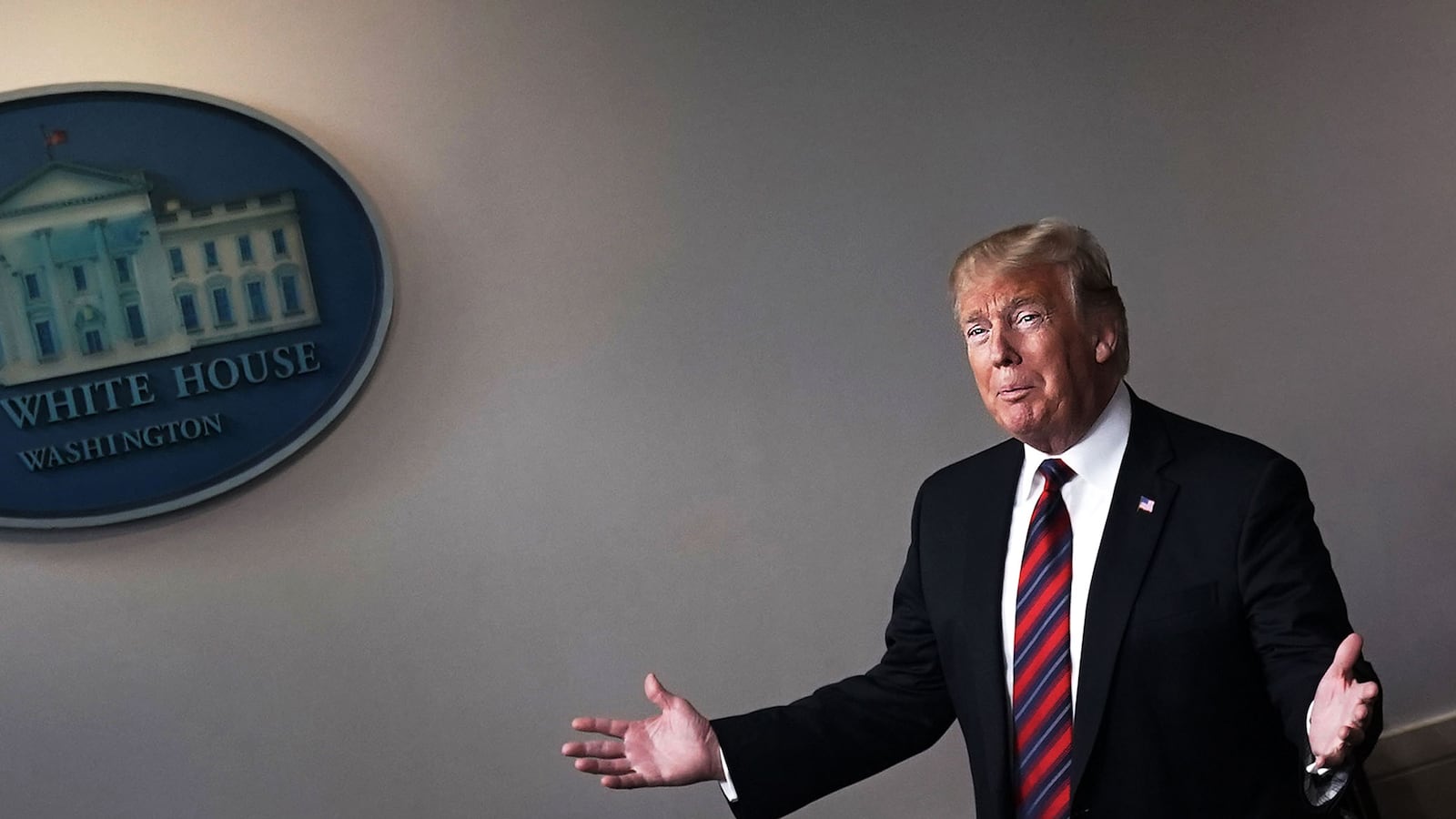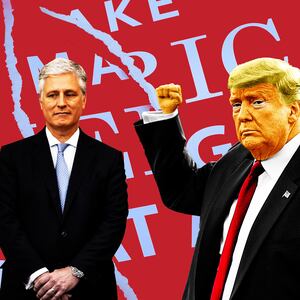The top Democrats on the Senate intelligence and armed services committees are trying to stop one of President Donald Trump’s White House attorneys from taking over as the senior lawyer for the National Security Agency, the Daily Beast has learned.
Early last week, Michael Ellis was tapped as the surveillance giant’s top lawyer, reportedly an act of the White House in its final days. That rang alarm bells among Democrats and within certain intelligence circles. Not only was Ellis supposedly one of the Trump aides who helped Rep. Devin Nunes (R-CA) manufacture a surveillance “unmasking” scandal, he was implicated in moving to a classified server the record of Trump now-infamous phone call with Ukrainian President Volodymyr Zelensky—the call that helped get Trump impeached.
Yet maneuvering is underway to block Ellis’ appointment. Sen. Mark Warner (D-VA), vice chairman of the Senate intelligence committee, and Jack Reed (D-RI), the top Democrat on the armed services committee, have written to the inspector general of the Defense Department, of which NSA is a component, demanding an investigation into Ellis’ installation.
“The publicly reported facts, if accurate, constitute prima facie evidence of political influence in the selection for the top legal position at NSA or, alternatively, indicate possible irregularities which would be of great concern to our committees,” Warner and Reed wrote on Monday to Sean O’Donnell, the acting Pentagon inspector general.
The NSA general counsel is a position with civil service protections. In other words, a Biden administration cannot fire Ellis absent specific misconduct. That’s prompted concern, former officials say, that part of the final acts of the Trump administration is to embed loyalists within the bureaucracy, making real their accusations of a Deep State that overrides presidential authority.
“Trump is burning the whole house down,” said one former senior national security official. “He’s burning it down and trying to take everything with him.”
Ellis, who had been the National Security Council’s top intelligence official and a former aide to Trump ally Nunes, is said to have been seeking the NSA job for months.
Two former intelligence officials said that Ellis had yet to show up for work as of Thursday. One explained it as the amount of time it takes to administer polygraphs and other necessary tasks for NSA employment. But his scheduled arrival is generating internal anxieties. The other official, who was unsure why Ellis had yet to appear at Fort Meade, remarked, “This is a weird shit show.” An NSA spokesperson on Monday did not answer whether Ellis was at work.
Appointing the NSA general counsel is not the responsibility of Gen. Paul Nakasone, the NSA director. It’s the responsibility of the Defense Department general counsel, Paul C. Ney Jr. “I was told there was pressure on Ney, that the White House was leaning heavily on him,” said a former senior intelligence official. A White House spokesperson declined to comment.
Asked if the White House had leaned on Ney to hire Ellis, Defense Department spokesperson Air Force Lt. Col. Uriah Orland said, “The prescribed hiring process for that position was followed in every respect and an appropriate selection of a qualified and capable candidate was made.”
One of the former intelligence officials considered Ellis’ appointment less about a Trumpist intention to ransack the NSA than a testament to Ellis’ connections. “He has friends in high places who don’t give a damn about rules and norms,” the ex-official said.
Among Warner and Reed’s questions about Ellis' appointment concerns whether it conformed with the rules for hiring someone into the defense-and-intelligence subcategory of the career civil service. When a political appointee like Ellis gets selected for one of those positions, a civil-servant board is supposed to convene to review the nomination.
But there is confusion over whether that process has unfolded as it’s supposed to in Ellis’ case, given the last-minute appointment, first reported by the Washington Post. The career NSA attorney who has been functioning as senior counsel role, Teisha Anthony, a career civil servant who has far more surveillance experience, is said to have also been under consideration for the job.
“It's unclear to me whether Ellis has gone through the process properly. To do so within the career civilian federal workforce, it normally takes at least a few weeks, if not a few months,” said Nick Schwellenbach, a senior investigator at the Project on Government Oversight and a former official with the U.S. Office of Special Counsel.
In response, Orland said the Pentagon “does not comment on non-selected candidates, nor the internal processing of specific employees.”
Warner and Reed said the timing of the appointment, “less than a week following the Presidential election and mere moments after the sitting Secretary of Defense had been fired,” was “inherently suspect and requires further investigation.”
As with the other Trump loyalists installed last week in the Defense Department, there is confusion and concern over what Ellis may be there to do. The NSA general counsel is powerful, with full access to NSA’s vast surveillance enterprises. But its power depends substantially on the prerogatives of the director. The senior lawyer is the director’s consigliere, providing advice on everything from budgets to public communications to relationships with the NSA’s cherished foreign surveillance partners.
Trump is said to want information that supposedly exculpates him or bolsters his narratives released from the classified warrens of the intelligence agencies, an issue that, according to Post columnist David Ignatius, has put the outgoing president at odds with CIA Director Gina Haspel and other intelligence officials.
Two former intelligence officials said that Ellis could, by virtue of his position, pass along surveillance material—whether contextualized or not—to his old boss Nunes or another political ally with the appropriate security clearance. But he’d be “playing with fire on that,” one of them said.
As a new civil servant, under a two-year probationary period, Ellis would be at risk of termination with relatively minimal cause.
Should Ellis make it to Fort Meade, he’ll have about half a year to act as he intends before a Biden administration could move him out of the position. After Biden’s inauguration, Ellis will be entitled to civil service protections that could delay moves to dismiss him. But reassigning him is a different story. He might become “senior counsel in charge of stapler policy,” remarked an ex-NSA official, who noted that undesirable reassignments are “sometimes used as a voluntary way to encourage problematic officials to voluntarily separate from service.”
But he will lack any authority to execute any surveillance, multiple former officials said. Nor is the general counsel what’s called an “original classification authority,” meaning the top NSA lawyer can’t unilaterally classify or release signals intelligence or analysis.
“He doesn’t have the last word on classifying something at all. He can’t order the surveillance of anything or anybody, and he can’t stop surveillance on anything and anybody,” one of the former senior intelligence officials said.
A Pentagon official argued that political connections for an NSA general counsel are “clearly not automatically disqualifying,” pointing to Obama-era general counsels serving as an assistant to President Barack Obama and fundraising for the Obama 2012 campaign.
If the purpose of Ellis’ appointment is to declassify and funnel to MAGA allies surveillance material that either supports their narratives—on Trump and Russia, on Biden and Ukraine or China or otherwise—doing so will be perilous for him, civil service protections or not.
Whatever happens with the maneuvering to block Ellis, his potential presence at the NSA is a test for Nakasone–whether the director views him as a potential problem or comes to trust him.
“The big question,” said a former Justice Department official, “is what he can do without Nakasone.”
Having political officials burrow into civil-service positions used to bother Trump allies. “I am concerned that, due to the seniority of political appointees at many agencies, there could be pressure to approve these conversions outside the standard merit-based approach to federal hiring,” Sen. Ron Johnson (R-WI) wrote to the director of the Office of Personnel Management shortly after Trump’s 2016 victory. “It is imperative that we ensure our federal civilian workforce is merit-based and independent.”
—with additional reporting by Erin Banco






